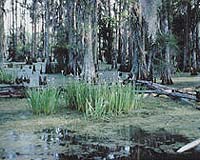| . |  |
. |
Greenville, Liberia (AFP) June 5, 2010 Conserve the rainforests and we will pay you... so goes the gist of an ambitious plan by the West to protect forests in developing countries including Liberia. And it could earn Africa billions of dollars. With its lush forests vulnerable to miners and loggers, Liberia is well-placed to join the scheme, through which African nations would earn money while at the same time helping the West to meet its climate change goals. Simply put, the scheme would see developing nations preserve their forests in return for cash from carbon-spewing industrialised countries. The forests would act as a massive sink to soak up harmful carbon emissions that are a prime factor behind global warming. Poor and battered by war but with its 40 percent forest cover under threat from farming, mining and logging, Liberia is a prime location for the project known as REDD (Reducing Emissions from Deforestation and Forest Degradation). Successful implementation could help in its development while protecting a fragile environment the over-burdened government doesn't have the ability to spend money on. "Sequestration of carbon is a new product that Africa can sell and the global community wants," Ravi Prabhu, senior programme officer for forests and climate change with the UN Environment Programme (UNEP) told AFP. "Looking across the Congo Basin, Liberia, Cote d'Ivoire (Ivory Coast), Nigeria, Ghana -- all the forested countries could gain enormously from this." Trees absorb the carbon via photosynthesis and change it into oxygen. While carbon stock assessments have not yet been carried out, Liberia's forest is believed to store between 100 to 300 tonnes of carbon dioxide per hectare. That's worth between 12 and 26 dollars per tonne to Liberia if sold to a developed nation which wants to compensate for its carbon emissions without hampering its industry. "It is serious money and could be used for development and poverty alleviation in countries that are traditionally poverty traps," said Prabhu. According to the UN Food and Agriculture Organisation's 2010 deforestation report, Africa lost 3.4 million hectares (8.4 million acres) in the past 10 years. With deforestation responsible for about one-fifth of the greenhouse gases in the atmosphere, according to World Bank figures, saving the rainforests is vital to curbing climate change. If countries like Liberia can put in place the necessary reforms, money could start flowing in about five years. "The potential in Africa is enormous but the challenges to reaching that potential are also quite enormous," said Kim Carnahan, policy leader with the International Emissions Trading Association. Getting to the point of selling carbon offsets through REDD is a long and complex process involving consultation, taking carbon stock inventories and ensuring forest communities participate and benefit. The UNEP's Prabhu says the biggest concern with the implementation of REDD is corruption and setting up the infrastructure to allow carbon payments to be distributed fairly. "The whole story of Liberia was corruption and forests," he said, referring to so-called "blood timber" sold off to fund its bloody war. "For African governments it is a question of how much of their forests they want to use for more consumptive use. It is an opportunity to earn money because they are standing -- that's what you get paid for." If it works, Africa and other developing countries have the opportunity to contribute to climate change mitigation and plough this money back into development. "This new form of protecting the forest is at the same time trying to generate benefit from the forest without cutting it down," said Nouhou Ndam, chief technical advisor for REDD with the British-based NGO Fauna and Flora International, which is helping Liberia design its pilot carbon project. REDD has gained momentum since the Copenhagen climate summit in December, and has now garnered pledges worth four billion dollars up to 2012. Norway, which hosted the most recent climate conference, said combating deforestation could account for a third of all measures needed by 2020 to limit global warming to a rise of two degrees C (3.6 F). Other countries in Africa to pilot REDD, out of 22 worldwide, are the DRC, Gabon, Ghana, Kenya, Liberia and Madagascar.
Share This Article With Planet Earth
Related Links Forestry News - Global and Local News, Science and Application
 Traumatized by Katrina past, Louisiana fears for its marshes
Traumatized by Katrina past, Louisiana fears for its marshesMarrero, Louisiana (AFP) June 5, 2010 Engulfed by devastating floods during Hurricane Katrina five years ago, New Orleans now fears for its surrounding protective marshes, threatened by a spreading oil slick. With entire neighborhoods sitting below sea level, the city of jazz is encircled with levees and flood walls along the Mississippi River and Lake Pontchartrain. But the August 2005 hurricane caused several breaches in t ... read more |
|
| The content herein, unless otherwise known to be public domain, are Copyright 1995-2010 - SpaceDaily. AFP and UPI Wire Stories are copyright Agence France-Presse and United Press International. ESA Portal Reports are copyright European Space Agency. All NASA sourced material is public domain. Additional copyrights may apply in whole or part to other bona fide parties. Advertising does not imply endorsement,agreement or approval of any opinions, statements or information provided by SpaceDaily on any Web page published or hosted by SpaceDaily. Privacy Statement |